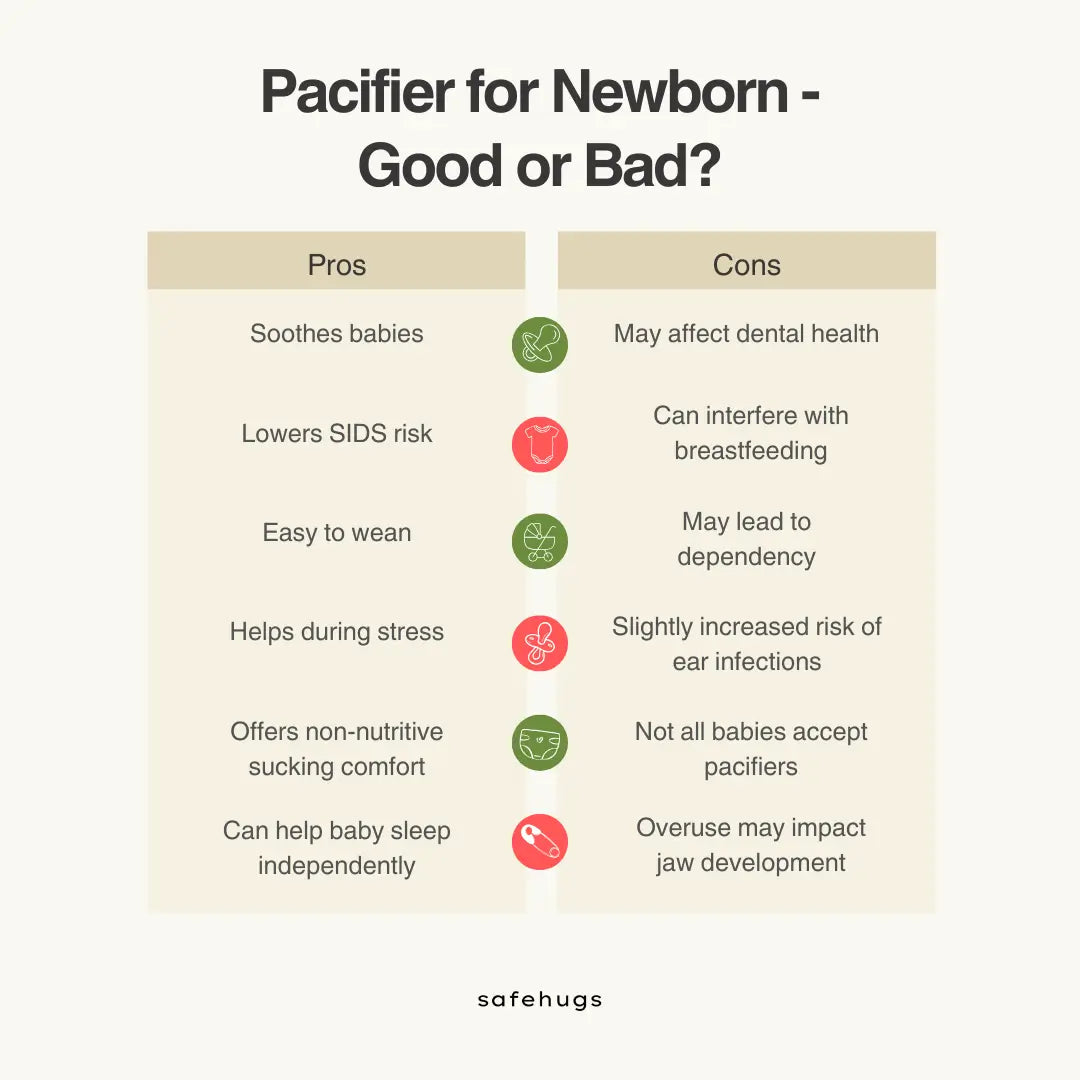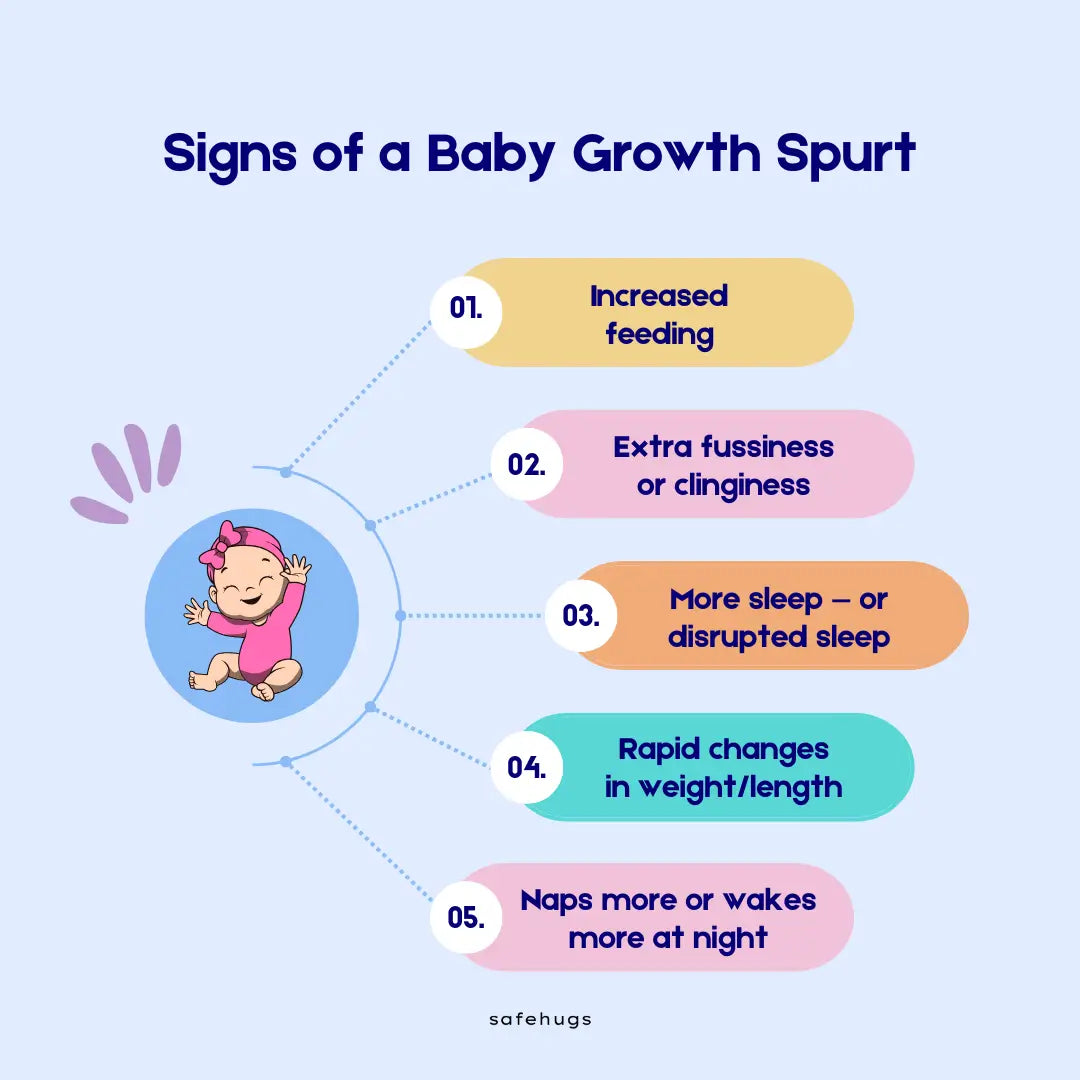How to Soothe a Baby with Colic (Home Remedies)
Table of Contents
What Is Colic?
Colic is intense, unexplained crying in an otherwise healthy baby. It's not a disease. It's not something you caused. But it can feel overwhelming when it happens daily, often around the same time, usually in the evenings.
The 3-3-3 Rule of Colic
Doctors often use this simple rule to identify colic:
- Crying for 3+ hours a day
- At least 3 days a week
- For over 3 weeks in a row
If that sounds familiar, your baby might be colicky. But remember, it's not forever. Most colicky babies grow out of it by 3 to 4 months.
How is Colic Crying Different from Regular Crying?
Here's what to look for:
- Colic crying is sudden, intense, and happens at the same time daily
- Your baby may clench fists, arch the back, and have a red face
- The crying is inconsolable, even if they're fed, changed, or rocked
Colic is frustrating but not harmful. Knowing that there's a name for this kind of crying can be the first relief for many new parents.
What Causes Colic in Babies?
One of the hardest parts of dealing with colic is not knowing why it happens. You're doing everything right - feeding on time, rocking gently, burping after every feed and still, your baby cries uncontrollably. It's confusing and sometimes even guilt-inducing. But here's the truth: the exact cause of colic is still unknown. What we do have are a few strong theories based on experience and research.

Commonly Believed Causes of Colic
- Immature Digestive System: In the first few months, your baby's digestive system is still learning how to process food and pass gas. This can lead to tummy discomfort, which shows up as crying.
- Gas Build-Up: Babies tend to swallow air while feeding or crying, leading to gas and bloating. That trapped air causes pain, especially if it's not released properly through burping or passing stool.
- Sensitivity to Feeding or Formula: Some babies may be sensitive to components in formula or even something in a breastfeeding mother's diet (like dairy or certain vegetables). This doesn't mean you need to overhaul your diet but small adjustments can help.
- Overstimulation: Too many visitors, loud sounds, bright lights, or too much activity can overwhelm a baby's developing nervous system. Many parents in India notice colic episodes peak in the evening right after a long, stimulating day.
- Natural Temperament: Some babies are just more sensitive than others. Their threshold for discomfort or hunger is lower, and they respond with strong, prolonged crying.
Common Symptoms of Colic
Colic can feel overwhelming, especially because the signs often mimic hunger, tiredness, or discomfort. The key difference? With colic, nothing seems to soothe your baby for long.
Here are the most common signs of colic to help you identify it early:

The "3-3-3" Rule (Widely Used by Pediatricians)
- Crying for more than 3 hours a day
- For more than 3 days a week
- Lasting for at least 3 weeks
What Colicky Crying Looks Like
- Intense, high-pitched crying that starts suddenly, often in the evening
- Crying episodes that occur at the same time each day, usually late afternoon or night
- Body tensing up: clenched fists, arched back, stiff arms or legs
- Red face during or after crying
- Pulling legs to the tummy - a sign of gas discomfort
- Difficulty passing gas or burping
- Trouble sleeping or feeding, even when visibly tired or hungry
Indian Parenting Observations
Many Indian families note that colic often begins after the nazar utarna (evil eye removal) rituals or evening baths. This isn't your fault, it's just when babies are more tired, overstimulated, and likely to express discomfort.
Some babies cry after every feed, despite being well-fed. Others may pass stool irregularly, which can add to the confusion - is it gas, constipation, or colic?
Quick Tip: Keep a cry diary. Note the time, duration, and possible triggers. It can help your doctor and you spot patterns.
How to Prevent and Soothe Colic
When your baby cries inconsolably and you've tried "everything," it's easy to feel helpless. While colic isn't caused by anything you did wrong, simple shifts in routine, feeding, and care can go a long way in preventing and soothing those long crying spells.
For Breastfeeding Moms
- Watch your diet: Some babies react to dairy, caffeine, or spicy food through breast milk. Try eliminating one thing at a time (start with dairy) and observe.
- Correct latch = less air intake: Improper latching can cause your baby to swallow air, leading to gas. A lactation consultant can help if you're unsure.
- Switch sides only after one breast is empty to avoid excess foremilk, which can be harder to digest.
For Bottle-Fed Babies
- These bottles are specially designed to minimize the amount of air a baby swallows while feeding, which can significantly reduce gas and colic-related discomfort. Brands like Dr. Brown’s, Philips Avent, and Comotomo are trusted choices - recommended by Stuti, a mom from our Mom Insider Community.
- Feed in a semi-upright position to prevent milk from flowing too fast or causing reflux. "When bottle feeding, try slow feeding and keep the baby slightly upright to reduce air intake." - Vigya, Mom Insider Community
- Pace the feed: Give breaks every few minutes and burp your baby mid-feed.
"To prevent colic, you can use slow-paced feeding bottles which are easily available on FirstCry and Amazon." - Stuti, Mom Insider Community
Universal Soothing Tips
- Burp your baby after every feed: Even if they don't always burp, try for a few minutes to release trapped gas.
- Try gentle tummy massage: Use circular, clockwise motions around the navel.
- Swaddle in a soft cotton cloth, especially in cooler climates, to create a womb-like comfort.
- Use white noise or gentle lullabies: Soft bhajans or humming a familiar tune often calms babies, especially in Indian households.
Do you know? Studies show motion like being rocked or walked, can reduce crying by up to 60%. That's why so many Indian families instinctively sway or take babies for a stroller ride in the evening.
Home Remedies and Natural Relief for Colic
You don't always need medicine to soothe a colicky baby. In many Indian homes, grandmothers have passed down gentle, effective remedies for generations and modern parenting is beginning to rediscover their value.

While not every remedy works for every baby, here are some time-tested, safe, and parent-approved options to try at home:
1. Tummy Time or Gentle Tummy Pressure
Lay your baby on their tummy across your lap or on a soft surface for a few minutes while supervised. The gentle pressure helps release trapped gas and soothes discomfort.
"Applying a paste of hing (asafoetida) and warm water around the baby's navel area can provide relief, an old Indian remedy still trusted by many moms." - Stuti, Mom Insider Community
2. Warm Compress on the Stomach
Soak a soft cotton cloth in warm (not hot) water, wring it out, and place it on the baby's tummy for a minute. This relaxes the abdominal muscles and can help relieve cramps.
Traditional Tip: Some parents use ajwain (carom seeds) wrapped in muslin cloth, heated slightly, and applied gently to the tummy.
3. Colic Roll-ons and Baby-Safe Oils
Natural colic relief roll-ons made with hing (asafoetida), fennel, or peppermint oil are increasingly popular and available. Always do a patch test and choose products made specifically for babies.
- Avoid applying directly on skin unless instructed.
- Don’t use essential oils without medical guidance.
4. Massage Therapy
A daily, warm oil massage using coconut or baby-safe oil improves digestion and soothes the nervous system.
- Focus on circular motions on the belly and gentle strokes on the legs.
- Best done before bath time or in the evening when babies tend to get fussy.
5. Sleeping Position
- Let your baby sleep on their back, but try holding them upright for 15–20 minutes after feeding before placing them down.
- Elevating the head slightly (with a wedge under the mattress, never a pillow) can reduce reflux-related fussiness.
Unpopular but honest opinion: Sometimes, too many remedies at once can overwhelm both the baby and the parent. Pick one method, try it consistently for a few days, and give it time
Medicines and Colic Drops: Are They Safe?
It's 2 a.m., your baby's crying hasn't stopped for an hour, and you're scrolling through online forums with one hand while rocking your baby with the other. You read about something called "Colic Drops." But are they really safe? And do they work?

First, the short answer:
Yes, colic drops can help some babies but they should be used cautiously, and only after consulting your pediatrician.
Commonly Used Colic Drops in India:
- Colicaid
- Colic EZ
- Gripe water (controversial and often discouraged)
- Gas relief drops (simethicone)
"Gripe water worked for some, but my doctor advised against it due to sodium bicarbonate. Himalaya Bonnisan was a great alternative and worked well for my baby." - Nikita, Mom Insider Community
When Are Colic Drops Used?
- If your baby is extremely gassy or showing signs of stomach discomfort.
- When natural remedies haven't helped.
- If your pediatrician rules out other health issues.
"I gave my baby colic drops occasionally, they worked, but I prefer not making it a habit. Regular burping helped more." - Shweta, Mom Insider Community
What's Inside These Drops?
- Simethicone: Helps break down gas bubbles in the stomach. Considered safe and commonly prescribed.
- Dill oil, fennel extract, caraway oil: Herbal ingredients found in many Indian colic solutions.
- Alcohol or sugar: Found in some traditional gripe waters, these are not recommended.
Real dilemma: Many parents admit they've used gripe water on a relative’s advice, only to stop later when told it might not be safe.
What Indian Parents Commonly Ask
"Is it because of evil eye?"
While it's important to respect cultural beliefs, colic is more likely linked to biological and environmental factors than anything supernatural.
"Did I eat something wrong during pregnancy?"
Colic isn't caused by what you ate during pregnancy. You didn't cause this.
"Is formula causing this?"
Possibly. But not always. Sometimes it's not about what you feed but how timing, temperature, and posture also play a role.
Addressing More Popular Queries:
"Are colic drops safe for newborns?"
Simethicone-based drops are generally considered safe, but always ask your doctor.
"Is Colicaid safe for infants?"
Often prescribed, but dosage and frequency matter. Do not self-medicate.
"Colic drops side effects?"
Side effects are rare but can include loose stools, rash, or allergic reaction. Monitor after the first dose.
Expert Tip :
Start small. Use medicine only when necessary and never as the first or only solution. Babies grow out of colic, sometimes the best medicine is time and calm presence.
When to See a Pediatrician
Colic can be exhausting, but it's usually harmless. Still, there are moments when it's more than "just colic." Here's how to know when it's time to check in with your doctor.
Call your pediatrician if:
- Your baby's crying lasts more than 3 hours, even after trying soothing techniques.
- Crying is high-pitched, sounds painful, or suddenly changes tone.
- Baby refuses to feed, loses weight, or shows poor weight gain.
- You notice fever, vomiting, or changes in stool (very runny, mucus-filled, or with blood).
- Baby appears lethargic, unresponsive, or overly sleepy.
- You sense something is off, even if you can't explain it.
Your intuition as a parent matters - don't wait for proof to ask for help.
What will the doctor do?
- Check for signs of reflux, allergies, or infections.
- Assess feeding patterns and growth.
- Rule out underlying medical issues that mimic colic.
- Recommend changes in feeding, drops, or formula if needed.
In India, pediatricians may also consider traditional care advice alongside medical guidance - don't hesitate to ask about both.
Final Thoughts
If your baby has colic, you're not alone and you're not doing anything wrong. In fact, colic affects 1 in 5 babies, yet it still leaves many parents feeling helpless, confused, and even guilty.
But here's what most people don't say out loud:
It's okay to try everything and still feel like nothing is working.
Colic isn't caused by bad parenting. It doesn't mean your baby is in pain or that something serious is wrong. Sometimes, it's just a phase and like all phases, it will pass.
What we wish more parents knew:
- Trial and error is normal. What soothes one baby may not work for another.
- Your touch and presence matter, even if the crying doesn't stop right away.
- Ask for help from your partner, your mother, a neighbor, or your doctor. You're not meant to do this alone.
- It's okay to take a break. A calm parent helps calm a baby. Place your baby safely in the crib, take a breath, and step away for a moment.
At Safehugs, we believe parenting is as much about care as it is about community. Whether you're rubbing a tiny back at 2 AM or Googling remedies at nap time, remember this: You’re doing a beautiful job.
Related:
- Check out our blog on Milk bleb treatment.
- Check out our blog on Vaccination Schedule in India for Kids.
- Check out our blog on Top 10 Parenting Apps For Indian Parents.
- Check out our blog on Top WhatsApp Groups for Moms in India.
- Check out our blog on Top 10 Parenting Blogs in India.
- Check out our blog on WhatsApp Support Groups for Single Parents.
FAQ'S
1. How do you get rid of colic in babies fast?
There’s no magic switch, but gentle relief is possible. Burping your baby during and after feeds, using a warm compress or tummy massage, holding them upright, or even taking a calming stroller or car ride can help. Pacifiers and snug swaddles work wonders for some. Colic usually peaks around 6 weeks and tends to fade by 3 to 4 months.
2. Has anyone given colic aid drops regularly?
Yes, many Indian parents have used drops like Colicaid after consulting their pediatrician. They’re usually given for a few weeks to ease symptoms. Just make sure to follow the prescribed dose, avoid combining with gripe water or home remedies, and stop if you notice any side effects.
3. Why is colic medicine given to a baby?
Colic drops are used to ease gas, tummy discomfort, and reduce crying spells linked to digestive issues. But it’s about treating the discomfort, not just stopping the tears.
4. How long does colic last?
Colic often begins around 2 to 3 weeks of age, peaks at about 6 weeks, and improves by the time your baby is 3 to 4 months old. It’s a phase — challenging, yes — but it will pass. And no, you’re not doing anything wrong.





























